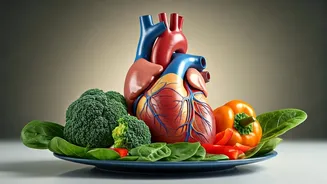Cholesterol: The Basics
Cholesterol, a waxy substance naturally present in our bodies, is essential for vital functions. It plays a role in building cells, producing hormones,
and aiding in digestion. However, elevated cholesterol levels can lead to serious health problems. It's carried in the blood by lipoproteins. Low-density lipoprotein (LDL), often called "bad" cholesterol, can build up in arteries, increasing the risk of heart disease. High-density lipoprotein (HDL), the "good" cholesterol, helps remove LDL from the arteries. Understanding these basics is the foundation for managing cholesterol effectively. Making informed food choices can help modulate your cholesterol profile and overall health.
Dietary Fats Explained
The types of fats in our diet significantly impact cholesterol levels. Saturated fats, found mainly in red meat, processed foods, and full-fat dairy, can raise LDL cholesterol. Trans fats, often found in fried foods and baked goods, are particularly harmful because they elevate LDL while lowering HDL. Unsaturated fats, on the other hand, are generally considered heart-healthy. Monounsaturated fats, present in olive oil and avocados, can help lower LDL cholesterol. Polyunsaturated fats, found in fatty fish and certain nuts, also benefit heart health. Paying attention to fat sources is pivotal in managing cholesterol. Shifting from saturated and trans fats towards unsaturated fats is an effective dietary strategy for improving cholesterol profiles.
Fiber's Role in Health
Fiber, especially soluble fiber, plays a crucial role in lowering cholesterol. Soluble fiber, found in oats, beans, apples, and other fruits and vegetables, binds with cholesterol in the digestive system. This process prevents cholesterol absorption, leading to its excretion from the body. Eating at least 5-10 grams of soluble fiber daily can significantly impact cholesterol levels. Moreover, fiber helps with weight management, blood sugar control, and promotes overall digestive health. Integrating fiber-rich foods into your diet is a simple yet powerful way to support heart health and maintain healthy cholesterol levels. Adding foods like oatmeal and legumes can make a noticeable difference.
Foods to Prioritize
Certain foods are particularly beneficial for lowering cholesterol. Oatmeal and other whole grains, rich in soluble fiber, are excellent choices. Fatty fish like salmon and tuna, high in omega-3 fatty acids, can help reduce LDL cholesterol. Nuts and seeds, offering healthy fats and fiber, also support heart health. Legumes, including beans and lentils, provide soluble fiber and contribute to overall health. Fruits and vegetables, especially those high in antioxidants, play a crucial role in preventing arterial damage. Emphasizing these foods in your diet provides a proactive and enjoyable approach to managing cholesterol levels. Making these adjustments can also improve overall dietary quality.
Foods to Limit
Certain foods can elevate cholesterol levels and should be limited. Red meat and processed meats contain high levels of saturated fats, which can increase LDL cholesterol. Full-fat dairy products, like whole milk and cheese, also contribute to saturated fat intake. Fried foods and commercially baked goods often contain trans fats, which are detrimental to heart health. Sugary drinks and excessive amounts of added sugars can indirectly raise cholesterol levels and contribute to other health issues. Being mindful of these foods and reducing their consumption is a key aspect of a heart-healthy diet. Reading food labels can help in making informed choices and limiting these less-desirable ingredients.
Beyond Diet: Other Factors
While diet is paramount, other lifestyle factors also influence cholesterol levels. Regular physical activity can increase HDL cholesterol and improve overall cardiovascular health. Maintaining a healthy weight helps manage cholesterol levels and reduce the risk of other health issues. Quitting smoking has a positive impact, as smoking lowers HDL cholesterol. Stress management techniques can also contribute to heart health. It's important to adopt a holistic approach by combining dietary changes with exercise, stress management, and avoiding unhealthy habits. Consulting with a healthcare professional can give personalized advice.
Creating a Plan
Developing a structured plan is essential for effective cholesterol management. Start by assessing your current diet and identifying areas where improvements can be made. Set realistic goals, focusing on small, sustainable changes. Increase your intake of soluble fiber-rich foods, reduce saturated and trans fats, and limit processed foods. Plan your meals for the week, incorporating a variety of heart-healthy foods. Keep a food diary to monitor your progress and make necessary adjustments. Seek guidance from a healthcare provider or a registered dietitian. Tailor a dietary plan to your specific needs and preferences to make it sustainable and effective. Consistency and patience are vital for achieving long-term success.












